Black Woman, White Skin
Her parents were black, but she looks white. Kenosha Robinson on trying to figure out where she fits in.
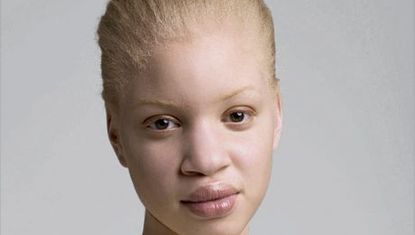
Growing up in Jackson, MS, I gravitated toward white people. It felt natural, I suppose, because I looked like them. While my cousins got black baby dolls for Christmas, mine were always peaches and cream. Once, during playtime in elementary school, one of the black girls told me I couldn't join her group. My doll, she said, was the wrong color.
Later, I understood what she meant was that I was the wrong color. Like my doll, I was blonde and green-eyed-the only one in a mass of brown skin. I am African-American, born with a genetic abnormality called albinism, meaning I've got little to no pigment in my skin. Albinism is a recessive trait, so both parents must carry the gene in order to conceive a child with it. It's more common than you'd think-one in 17,000 children is born with albinism.
My mom was only 16 when I was born. She did her best to protect me, but I knew early on that I was different. Everywhere we went-the mall, the grocery store-people stared at me. You could see the question on their faces: "Is she really yours?"
My dad died from pneumonia when I was 7. Mostly what I remember about him is the way he stood up for me. One day I asked him, "Why do people always look at me?" He said, "It's because you're so beautiful."
But some of my extended family were less charitable. Most of my relatives are from the Mississippi Delta, where blacks and whites still live separately. The notion of forming a friendship with a white person is foreign to my relatives, so how were they supposed to treat me? The only way, it seemed, was by singling me out and teasing me. "White girl!" they'd call me. I felt like I was a betrayal to my race.
My mom had more practical fears, like whether I'd get sun damage if she let me go outside. The complete absence of melanin in my skin means I don't tan-I just burn, baby, burn. Any time I went to a family reunion or church picnic, she'd slather me with sunscreen and make me wear a hat. During recess, I had to sit in the shade. When I was in fourth grade, my mom wrote a note to excuse me from field day, but I didn't give it to my teacher. Instead, I played all day under the hot sun. When I got in the car after school, my mother noticed that my face was red. I tried to lie my way through it, but my face kept getting redder, and my body started blistering. I didn't go to school for a week because I was so sick.
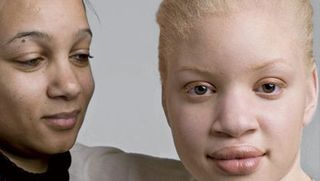
My health issues pretty much guaranteed I'd never be one of the cool kids. I hated having to wear a hat. And more than anything, I hated the questions I got about my eyes. When someone is born with albinism, they are usually declared legally blind. Though I can see, I have nystagmus, which causes my eyes to shift rapidly from side to side in order to find a focal point. Whenever I meet someone new, I count the minutes before they ask, "What's wrong with your eyes?"
Stay In The Know
Get exclusive access to fashion and beauty trends, hot-off-the-press celebrity news, and more.
But health issues can't compare with the struggles I've faced with my self-esteem. As a teenager, while classmates were griping about acne and getting their periods, I was facing a different kind of crisis: Who was I? Was I a white girl with black parents? Or a black girl living inside a white girl's body?
Mississippi, of course, has a tense racial past. Though the KKK is no longer in full force, white supremacist Jim Giles ran for Congress with a vocal (if unsuccessful) anti-black campaign in 2004 and 2006. Blacks and whites rarely mix. In a weird way, I felt I was the uncomfortable meeting point between these two groups. In high school, I earned the respect of my white friends for my smarts and quick wit. They elected me class president. But they also excluded me socially. When I'd ask, "What are you doing this weekend?" they'd brush me off, coming up with some bogus errand they had to do. Other times, they were openly rude, making plans for weekend get-togethers in front of me-but never actually inviting me along. My black friends were similarly respectful at school, while shying away from me at the skating rink or the mall, especially when boys came along.
As for the prom, forget it. That was a nightmare waiting to happen. A black guy might take a white girl to the prom, but taking the black girl who looked white was another story. One day in class, the cool black guys asked me who was taking me. I said, with shaky confidence, that I was going alone. I heard one of them snicker, "That's because no one's gonna take her!" In the end, I stayed home. Looking back, I can't believe I was too intimidated to go to my prom.
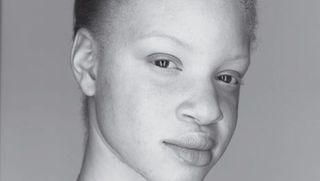
At a certain point, it occurred to me that I needed to "pick" my race-life would be easier if I aligned myself with a side, rather than constantly explaining myself to both. I chose the blacks. We share a heritage, and in Mississippi, there is real pride within the black community. Still, I felt the need to prove my "blackness." I started speaking slang. I began listening to rap. I thought knowing the words to songs about gold teeth, money, women, and cars would make me sufficiently ghetto.
Despite my efforts, I was still mistaken for a white girl. So I established myself with an entirely different group-the class clowns. I ridiculed myself as a way of pre-empting comments from others, joking about "not being too white to whup your butt!" Other times, I kidded about being just white enough to "claim kidnapping" if my black friends and I ever got pulled over for speeding. But underneath, it was the same old story: I was actually afraid to look at myself in the mirror.
When it came time to choose a college, I considered attending a predominantly black university. "That's what I am," I told my mom. But she was hesitant, and in the end, so was I. Instead, I chose Millsaps, a mostly white, liberal-arts college in Jackson, where I'm now a junior. Here, in the cafeteria, racial segregation lives on: Blacks and whites almost never eat at the same table. A few months ago, some black students showed up at a white fraternity party. They were turned away and told that they were a bunch of . . . well, you can imagine what they were called. Even though no one would ever call me those names, I was still furious. My loyalty is to the black community. I will never set foot in that frat house again.
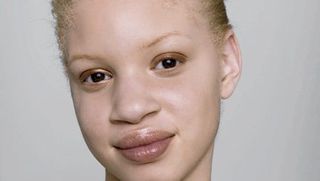
It was then that I started reclaiming my identity through weave-a traditional African hairstyle. I change it once a week, creating a new identity with each look. It gives me satisfaction to know that while I cannot alter my skin color, my hair is mine to play with.
My self-esteem is a work in progress. Sometimes, I'll be talking with a black friend, then look down at my skin and feel totally exposed, like, "I'm white and everyone can see it." But I'm becoming stronger and learning it's OK to just be Nosha, all 150 pounds of smile and laughter that I am. Still, seeing girls with beautiful caramel or chocolate skin sparks envy in me.
The last boyfriend I had made me feel special-in a good way-about my albinism. The uniqueness drove him crazy, and that gave me a lot of confidence. The man I marry will have to be intrigued, too. I probably want to marry a black man-even though I know it will be strange to have children who are a different color than I am-and I'd want him to be tested for the gene. Although I'm happy with who I am today, I wouldn't wish what I've gone through on anyone.
-
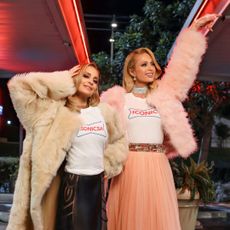 Nicole Richie Says Paris Hilton Friendship is More Like a Sisterhood
Nicole Richie Says Paris Hilton Friendship is More Like a SisterhoodThey have "a friendship that's longer than most marriages."
By Alicia Lutes Published
-
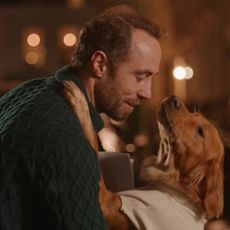 James Middleton Recreated the Famous ‘Love Actually’ Cue Card Scene to Help Spread an Important Message
James Middleton Recreated the Famous ‘Love Actually’ Cue Card Scene to Help Spread an Important Message"Dogs are for life—not just for Christmas."
By Kayleigh Roberts Published
-
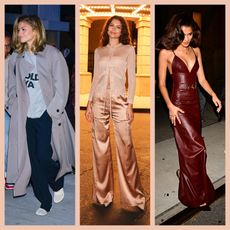 30 Things Zendaya Would Probably Buy in Nordstrom's Half-Yearly Sale
30 Things Zendaya Would Probably Buy in Nordstrom's Half-Yearly SaleFrom polished trench coats to sultry date-night dresses.
By Lauren Tappan Published
-
 36 Ways Women Still Aren't Equal to Men
36 Ways Women Still Aren't Equal to MenIt's just one of the many ways women still aren't equal to men.
By Brooke Knappenberger Last updated
-
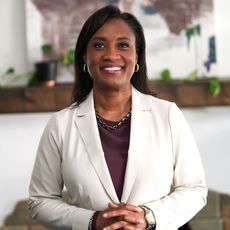 EMILY's List President Laphonza Butler Has Big Plans for the Organization
EMILY's List President Laphonza Butler Has Big Plans for the OrganizationUnder Butler's leadership, the largest resource for women in politics aims to expand Black political power and become more accessible for candidates across the nation.
By Rachel Epstein Published
-
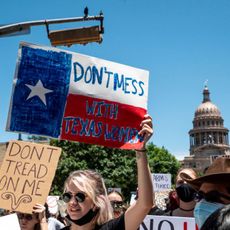 Want to Fight for Abortion Rights in Texas? Raise Your Voice to State Legislators
Want to Fight for Abortion Rights in Texas? Raise Your Voice to State LegislatorsEmily Cain, executive director of EMILY's List and and former Minority Leader in Maine, says that to stop the assault on reproductive rights, we need to start demanding more from our state legislatures.
By Emily Cain Published
-
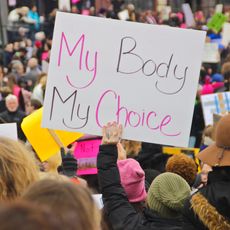 Your Abortion Questions, Answered
Your Abortion Questions, AnsweredHere, MC debunks common abortion myths you may be increasingly hearing since Texas' near-total abortion ban went into effect.
By Rachel Epstein Published
-
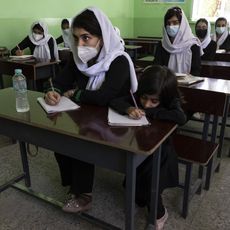 The Future of Afghan Women and Girls Depends on What We Do Next
The Future of Afghan Women and Girls Depends on What We Do NextBetween the U.S. occupation and the Taliban, supporting resettlement for Afghan women and vulnerable individuals is long overdue.
By Rona Akbari Published
-
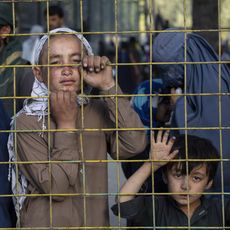 How to Help Afghanistan Refugees and Those Who Need Aid
How to Help Afghanistan Refugees and Those Who Need AidWith the situation rapidly evolving, organizations are desperate for help.
By Katherine J. Igoe Published
-
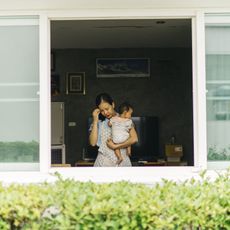 It’s Time to Give Domestic Workers the Protections They Deserve
It’s Time to Give Domestic Workers the Protections They DeserveThe National Domestic Workers Bill of Rights, reintroduced today, would establish a new set of standards for the people who work in our homes and take a vital step towards racial and gender equity.
By Ai-jen Poo Published
-
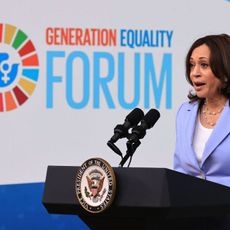 The Biden Administration Announced It Will Remove the Hyde Amendment
The Biden Administration Announced It Will Remove the Hyde AmendmentThe pledge was just one of many gender equity commitments made by the administration, including the creation of the first U.S. National Action Plan on Gender-Based Violence.
By Megan DiTrolio Published